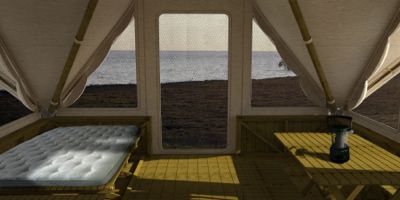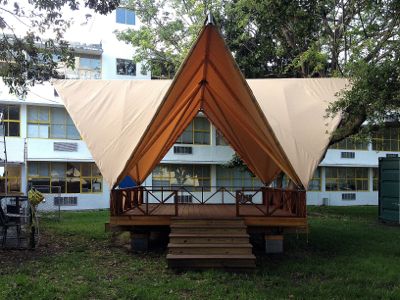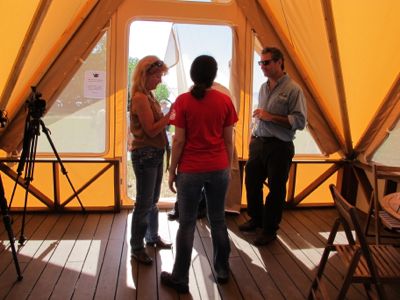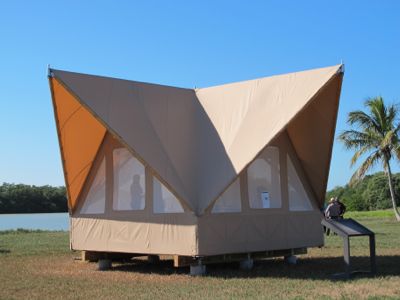
Eco-Tent debuts at Everglades’ campground
The Everglades National Park has come together with other South Florida institutions to open a new overnight lodging option, the Flamingo Eco-Tent, in the park.
The Flamingo Lodge, located in the Everglades since 1959, closed after two major hurricanes, Katrina and Wilma, swept through the southeastern United States in 2005. The storm surges pushed waters onto the shores of Flamingo, the southernmost part of the park, and destroyed the lodge and other cabins.
 |
A computer rendering of the interior of the Eco-Tent displaying the bed and table (Picture courtesy of Carlo J. Guzman De Jesus). |
Since the 2005 hurricane season, the desire for overnight lodging options has grown tremendously, especially from fishermen, anglers and fishing guides who depended on the lodge when not at sea.
But things are looking up for lodging in Flamingo. During the past decade, efforts have been made to increase camping opportunities in the area, most notably the Flamingo Eco-Tent.
The 14-foot by 14-foot prototype comfortably accommodates four adults and provides bed frames, a table and chairs. Up to eight people are allowed on the campsite, and it is available to rent from Dec. 14 through April 14 for up to three nights at a time to ensure a large sample of campers can experience the Eco-Tent and provide Flamingo with feedback.
“We hope this becomes one of several alternative lodging options and helps to kick-start rebuilding in Flamingo,” Don Finefrock, executive director of the South Florida National Parks Trust.
The Eco-Tent is a collaboration between the Everglades, the South Florida National Parks Trust, and the University of Miami School of Architecture. All three parties have worked on this project with hopes to jumpstart rebuilding overnight accommodations in the park.
The South Florida National Parks Trust is a non-for-profit organization founded in 2002 that strives to fundraise and support the four national parks in South Florida: the Everglades, Biscayne and Dry Tortugas National Parks, and Big Cypress National Preserve.
In January 2006, the South Florida National Parks Trust board met with the Dan Kimball, the superintendent of the Everglades National Park, and made a commitment to help recovery in the Flamingo area, according to Finefrock.
However, besides a down payment of $26,000, no additional planning had been solidified for the area.
| At right, the final product sits next to the University of Miami School of Architecture before being dismantled and transported to Flamingo (Photo courtesy of Carlo J. Guzman De Jesus). Below, student Violet Battat and an Everglades employee discuss the Eco-Tent with a journalist in Flamingo (Photo courtesy of Rocco Ceo). |  |
In 2011 Mike Jester, the Everglades maintenance chief, contacted the School of Architecture at the University of Miami looking for an intern architect to work in the park. Rocco Ceo, an architecture professor at the school, suggested having the two institutions working together to create a new lodging option, the Flamingo Eco-Tent, through a course in which students design and build the final product.
Led by professors Ceo and Jim Adamson, 11 fifth-year and graduate students met three times a week for 14 weeks to work on the pilot project.
Sam Vana, a recent graduate of the UM School of Architecture, is one of the students who took the design-build studio course.
“We spent the first couple of weeks in the studio designing and coming up with ideas to make the best product we could put out. Then there were a few weeks of creating documents and fixing details on paper. The last portion of the class was us outside and building each class,” Vana said.
Vana enrolled in the class because “everyone wants to have their designs built.”
Other students shared similar motivations. Ceo recalled, “An architecture student who draws and designs and never builds anything throughout their education can’t help to feel incomplete.”
 At the end of the spring 2012 semester, many of the students graduated from the program and therefore could not see the Eco-Tent reassembled in the Everglades due to pursuing new jobs and opportunities.
At the end of the spring 2012 semester, many of the students graduated from the program and therefore could not see the Eco-Tent reassembled in the Everglades due to pursuing new jobs and opportunities.
Kimball and Everglades staff approached the South Florida National Parks Trust for assistance in funding the construction of the Eco-Tent. The final cost for the prototype came to $17,000, an unexpected cost but one for which the trust was happy to help pay.
The Everglades’ next task was to advertise the Eco-Tent to the public. Through news releases to the media and promotion of the tent on the Everglades National Park homepage, the park had enough publicity to book the tent solidly for the entire four-month period. At of the beginning of March, the park only took reservations when there was a cancellation.
All of the hard work from the three parties involved paid off on Dec. 14, the day the Eco-Tent opened for rent.
All three partnering organizations find the experience to be mutually advantageous. But they’re not the only ones who gain from the Eco-Tent effort.
“The partnership with the University of Miami and South Florida National Parks Trust has been outstanding,” said Mary Plumb, acting public affairs offcer for the Everglades National Park. “Every visitor is benefitting from this.”
The Eco-Tent has received a lot of praise, notably for its “great vantage point of the Florida Bay unsurpassed in beauty and serenity,” Plumb remarked.
But some constructive criticism is still present.
“The experience is weather-dependent,” Finefrock said. “When it was warm with no breeze, the park discovered the Eco-Tent is not bug tight. But later in the winter season, it’s cooler and bugs are not a problem.”
Finefrock also said there is a lack of privacy because of mass interest from other campers in Flamingo. However, he said this will disappear with eventual greater exposure to and prevalence of the Eco-Tent.
The Everglades is looking to expand this lodging option in the Flamingo Campground. Prospective companies visited the Eco-Tent in February, after the Everglades released a prospectus for a concessions contract.
 |
The Flamingo Eco-Tent assembled on the Flamingo campgrounds and ready for its four-month debut, now with working walls (Photo courtesy of Rocco Ceo). |
Companies that show interest in producing more Eco-Tents and helping further develop Flamingo will bid for the contract, lasting 10 years.
“It’s a very legal process,” Plumb said. “The bid is open to anyone who wants it, and whoever provides a bid will go to a review panel later this year.”
If You Go
The Flamingo Visitor Center is approximately 38 miles from the Everglades’ main entrance near Florida City. Open from 9 a.m. to 4:30 p.m. Hours are subject to change.
For phone reservations, call 239-695-0124 between 6am and 6pm. At this time reservations are only taken if cancellations occur.

Comments are Closed